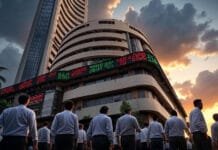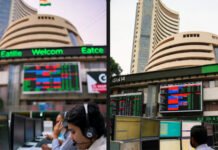Following the turbulence of the election results, the stock market demonstrated a strong recovery on Wednesday. The Bombay Stock Exchange (BSE) Sensex saw a substantial increase, gaining up to 600 points in early trade. Similarly, the National Stock Exchange (NSE) Nifty managed to surpass the significant 22000 level once again, marking a notable comeback from the previous day’s decline.
Early Trading Surge
At the onset of trading, the Sensex surged, reaching a high of 73,027.88 points, a remarkable increase of 948.83 points from its previous close. This recovery was driven by heightened buying activity at lower levels, indicating investor confidence despite recent market volatility. By 9:39 am, the Sensex was trading at 72,267.95, reflecting a gain of 188.90 points (0.26%).
Nifty mirrored this positive trend, initially rising 247.1 points to 22,131.60 points. Although some selling pressure was observed from the upper levels, Nifty maintained a strong position, trading at 21,930.55 points with a rise of 46.05 points (0.21%) by mid-morning.
Performance of Key Sensex Shares
Among the 30 shares comprising the Sensex, a mix of performances was noted. Hindustan Unilever, Nestle, Asian Paints, HCL Technologies, HDFC Bank, Kotak Mahindra Bank, and ITC emerged as the top gainers. These companies benefited from robust buying interest, contributing to the overall market uplift.
Conversely, Larsen & Toubro, Power Grid, NTPC, and State Bank of India experienced declines. The selling pressure on these stocks partially offset the gains seen in other sectors.
Market Reaction to Election Results
The market’s movement was heavily influenced by the election results. The National Democratic Alliance (NDA) surpassed the majority mark of 272 seats in the Lok Sabha, securing a strong position despite the BJP falling short of a simple majority for the first time since 2014. The BJP won 240 seats, while the Congress secured 99 seats.
Policy Continuation and Market Sentiment
A report from Motilal Oswal Research highlighted expectations for the continuation of the Modi administration’s policy agenda, focusing on investment-led growth, capital expenditure, infrastructure development, and manufacturing. Additionally, the report anticipated populist measures aimed at addressing rural discontent and supporting marginalized communities.
VK Vijayakumar, Chief Investment Strategist at Geojit Financial Services, noted that the market would require some time to fully absorb the unexpected election results. He predicted that stability would return but cautioned that volatility might persist until there is clarity regarding the new cabinet and key ministerial portfolios. The sharp market decline was seen as a potential reset of excessive valuations, potentially easing institutional buying once the political landscape becomes clearer.
Broader Market Indicators
Global Market Influence
Global market movements also played a role in influencing domestic sentiment. Asian markets presented a mixed picture, with Seoul and Hong Kong showing gains, while Tokyo and Shanghai saw declines. The US markets closed with gains on Tuesday, providing a positive backdrop for global investors.
Commodity Prices
In the commodities market, Brent crude, the global oil benchmark, experienced a minor decline of 0.04%, trading at $77.49 per barrel. The stability in crude oil prices provided some reassurance to investors concerned about inflationary pressures.
Foreign Institutional Investment
Provisional data indicated that foreign institutional investors (FIIs) withdrew a significant amount of Rs 12,436.22 crore from the market on Tuesday. This outflow was a response to the uncertainty surrounding the election results, contributing to the sharp decline observed earlier in the week.
Tuesday’s Market Plunge
The stock market faced its worst trading day in four years on Tuesday. The BSE Sensex plummeted by 4,389.73 points or 5.74%, closing at a two-month low of 72,079.05 points. At one point during the day, the Sensex dropped as much as 6,234.35 points or 8.15%, reaching a nearly five-month low of 70,234.43 points.
Similarly, the Nifty experienced a drastic fall, losing 1,982.45 points or 8.52% to end the day at 21,281.45 points. The session closed with Nifty at 21,884.50 points, marking a massive drop of 1,379.40 points or 5.93%.
Future Outlook
Investor Strategy
Given the current market conditions, investors are advised to adopt a cautious approach. The mixed global cues and the political uncertainty necessitate a balanced portfolio strategy, focusing on fundamentally strong stocks with a history of resilience in volatile conditions.
Sectoral Focus
Sectors such as FMCG, technology, and banking showed strength amidst the turmoil, indicating potential safe havens for investors. Conversely, sectors facing headwinds, such as power and infrastructure, may experience continued pressure until clearer economic and policy directions are established.
Policy and Economic Reforms
The continuation of key economic reforms and infrastructure projects is critical for maintaining investor confidence. As the new government settles in, market participants will closely monitor announcements related to fiscal policies, stimulus measures, and regulatory changes.
The stock market’s rebound on Wednesday signifies a cautious optimism among investors despite the underlying uncertainties. The gains in the Sensex and Nifty reflect a tentative recovery, driven by strategic buying at lower levels and expectations of continued policy support.
As the political and economic landscape evolves, market volatility is likely to persist. However, with a focus on robust economic policies and strategic sectoral investments, the market is poised to navigate these challenges and potentially return to a path of sustained growth.















